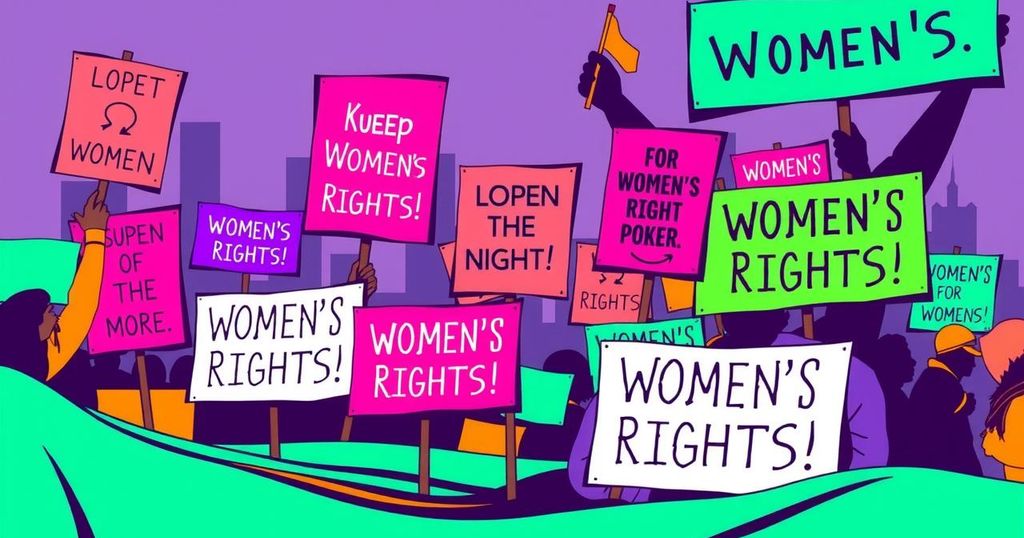The controversy surrounding Nigerian senator Natasha Akpoti-Uduaghan and her allegations of sexual harassment against Senate President Godswill Akpabio has ignited discussions on women’s rights in Nigeria. Despite Akpabio’s denial of the allegations and Akpoti-Uduaghan’s subsequent suspension from the Senate, widespread protests and public support for her highlight ongoing issues of gender inequality. The situation reflects larger societal challenges and the need for reform in how women’s voices are treated within the political landscape.
In July, Godswill Akpabio, a prominent Nigerian senator, issued a rare public apology after reprimanding colleague Natasha Akpoti-Uduaghan for speaking out in the Senate. Following a barrage of criticism from the public, he acknowledged his error, marking the beginning of a contentious period in Nigerian politics. Recently, Akpoti-Uduaghan accused Akpabio of sexual harassment during an interview, alleging incidents that reflect her claims of an inappropriate proposition and suggestive remarks made by him. Akpabio has categorically denied these allegations.
In light of her accusations, Akpoti-Uduaghan submitted a petition to the Senate which was ultimately dismissed on procedural grounds, leading to her six-month suspension for behavior deemed “unruly and disruptive”. This incident not only catalyzed a political scandal but also reignited discussions surrounding women’s rights in Nigeria, a nation where female representation in governance remains alarmingly low, with only four women in the 109-member Senate.
In a subsequent interview, Akpoti-Uduaghan expressed her outrage over her suspension, deeming it an attack on democracy and her right to speak out. Women’s rights organizations have vocally condemned her punishment and organized protests across various Nigerian states, emphasizing a collective call for support under the rallying cry, “We are all Natasha.” Activists have described the Senate’s actions regarding her suspension as disgraceful, underscoring the ongoing challenges women face in seeking justice and equality.
Ahmed Tijani Ibn Mustapha, a spokesperson for Akpabio, argued that Akpoti-Uduaghan’s petition was invalid as it did not follow required guidelines. After she refilled her complaint correctly, the Senate initiated a formal investigation into the allegations. Akpoti-Uduaghan’s political journey has not been without adversity; she has faced violence and intimidation during election campaigns and encountered various obstacles as a woman in politics. Despite these challenges, she emerged as one of Nigeria’s youngest senators after a tribunal overturned previous election results.
Akpabio, a seasoned politician, has faced prior accusations of sexual misconduct, which he has denied, and continues to maintain significant political influence as a close ally of the current president. Following Akpoti-Uduaghan’s suspension, she has received backlash from some male senators who dismissed her claims, showcasing the enduring culture of misogyny within the political sphere. Concurrently, negative narratives about her personal life have circulated online, revealing a coordinated effort to undermine her credibility.
While some opposition senators have rallied in support of Akpoti-Uduaghan, many women in Nigeria remain hesitant to voice their own experiences with sexual harassment. Despite the growing attention to her case, analysts suggest that the entrenched culture of impunity may obstruct meaningful change. The circumstances surrounding this incident highlight the complex dynamics women face in Nigeria’s political landscape, where societal norms often suppress their voices and experiences.
In summary, the escalating conflict between Natasha Akpoti-Uduaghan and Godswill Akpabio has sparked a vital conversation about women’s rights in Nigeria. Akpoti-Uduaghan’s claims of harassment, her subsequent suspension from the Senate, and the public response reveal systemic issues regarding gender inequality and the treatment of women in politics. The ongoing support from women’s rights groups underscores the need for reform while also indicating that significant challenges remain in achieving justice and equity in Nigerian society. The unfolding events mark a potential turning point, although it is evident that cultural and institutional barriers continue to hinder progress toward addressing sexual harassment and empowering women.
Original Source: www.theguardian.com






